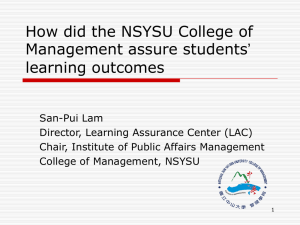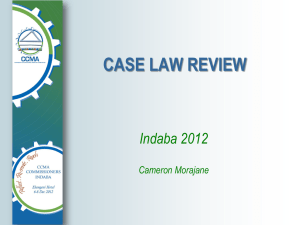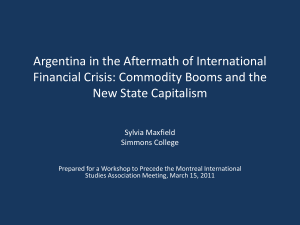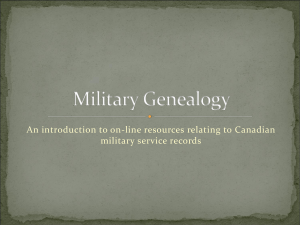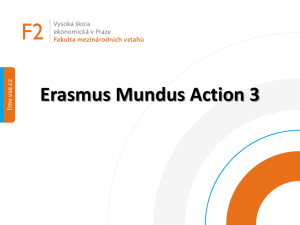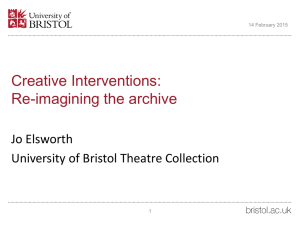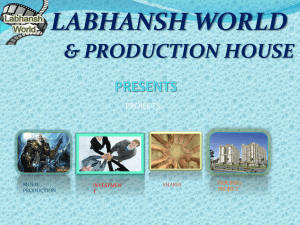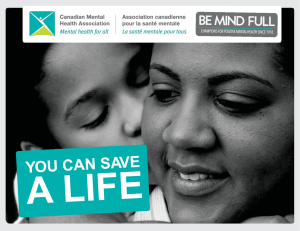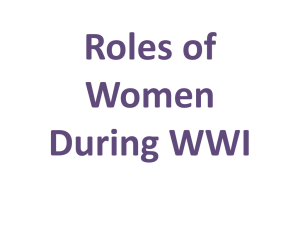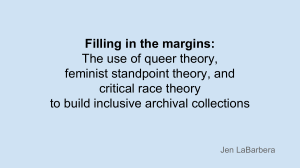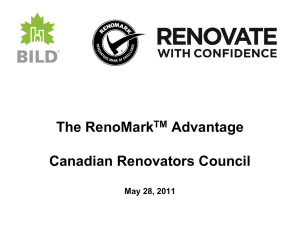Models of Collaboration between Archivers and Researchers
advertisement
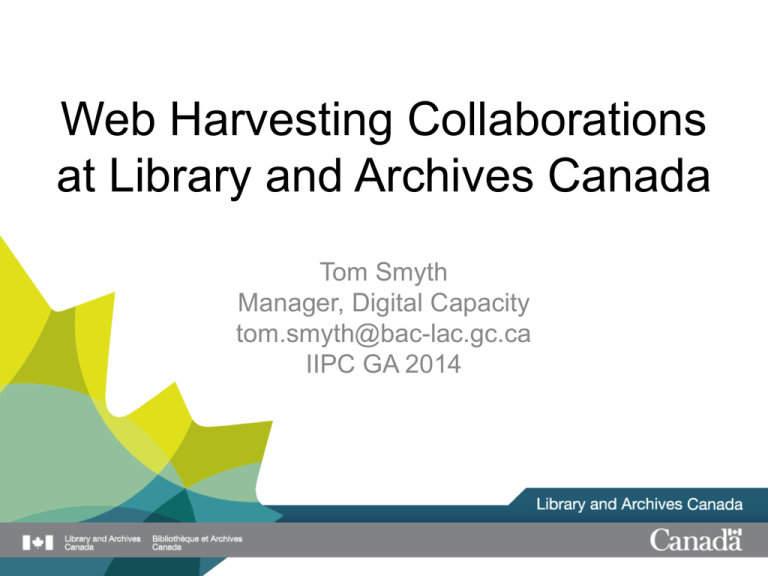
Web Harvesting Collaborations at Library and Archives Canada Tom Smyth Manager, Digital Capacity tom.smyth@bac-lac.gc.ca IIPC GA 2014 Operating Context LAC’s Legislative Context: Mandate Library and Archives of Canada Act (S.C. 2004, c. 11) Preamble WHEREAS it is necessary that (a) the documentary heritage of Canada be preserved for the benefit of present and future generations; (b) Canada be served by an institution that is a source of enduring knowledge accessible to all, contributing to the cultural, social and economic advancement of Canada as a free and democratic society; (c) that institution facilitate in Canada cooperation among the communities involved in the acquisition, preservation and diffusion of knowledge; and (d) that institution serve as the continuing memory of the government of Canada and its institutions; Legislative Context: Authorities for Collection Multiple authorities exist within the LAC Act that empower it to collect government information: • Section 10: Legal Deposit – Covers all publications that are published in Canada, including those from the GC. • Section 12 & 13: Government and Ministerial Records – Covers the disposition, transfer, and right of access to government records. Legislative Context: Authorities for Collection (2) Library and Archives of Canada Act OBJECTS AND POWERS Sampling from Internet Section 8. (2): “In exercising the powers referred to in paragraph (1)(a) and for the purpose of preservation, the Librarian and Archivist may take, at the times and in the manner that he or she considers appropriate, a representative sample of the documentary material of interest to Canada that is accessible to the public without restriction through the Internet or any similar medium”. LAC’s Web Harvesting: Background • LAC began harvesting with the Government of Canada web presence in 2005 – Hybrid library and archival methodological context – In total LAC has collected it four times (2005, 2006, 2007, 2013) • LAC’s makes this harvested data openly accessible via the Government of Canada Web Archive (GCWA, 2006) • Thematic material collected since 2005, but not according to a disciplined (library) collection development methodology until about 2009 7 Government of Canada Web Archive 8 WebCan Crawl Management Tool • Developed internally by LAC to allow acquisition staff to manage all operations: harvest definitions, seed lists, crawl management, quality assurance 9 Collection Overview • LAC’s web archival collection consists of: – Four comprehensive crawls of the Canadian federal government web presence (*.gc.ca, some *.ca) • (2005, 2006, 2007, 2013) – Decommissioned federal websites emergency-harvested between domain crawl periods • ~170 major departmental websites since 2009 – Thematic collections from the open Canadian web • ~15, built with increasingly complex collaborative relationships Recent Collaborative Projects Models of Collaboration • Internal collaboration – Librarians and Archivists at LAC working together to curate seedlists and web collections – 2005-2009 • Interdepartmental collaboration – Librarians, Archivists, PMs, Olympics Specialists – Olympic and Paralympic Web Archive – 2009- • Internal, Interdepartmental, Stakeholders – Librarians, Archivists, Policy, Government Administration and Technical Specialists from Central Agencies, and Govt Docs and Data Specialists – 2013- Olympic and Paralympic Web Archive Canadian Olympics Web Archive • LAC started curating web collections to document Canadian participation in the Olympic and Paralympic games shortly after the programme launched in 2005. • LAC has curated web archival collections for each of the following games: • • • • • Turin, Winter 2006 Beijing, Summer 2008 Vancouver, Winter 2010 London, summer 2012 Sochi, Winter 2014 Library and Archives Canada Vancouver 2010 Olympic and Paralympic Games Activities Olympics WA Key Questions • Who will be consulting our web archives? • Why will they consulting our web archives? • How will they use the web archives? – Data and text mining, looking for specific resources, social and cultural context • What sort of resources warrant entry to a web archive? • How can the web archive become a robust and multidisciplinary research tool? Vancouver 2010 Web Archival Project • LAC entered into a partnership with the Department of Canadian Heritage to build a web archive documenting the uniquely Canadian Vancouver 2010 games. – Selected based on the statistical needs of PCH (largely tourism) – Curated from the outset to cover broad social, cultural, economic, infrastructural, academic topics for maximum data and research applicability. – Nine iterative crawl jobs took place to capture 350+ websites (many 2-3 times each), comprising ~2 TB of data. Vancouver 2010 Olympic Games • Seedlist selected by Canadian Heritage specialists, representatives from the Federal Secretariat for the Vancouver Games, and LAC librarians and archivists • Olympics Studies methodologies were considered and factored in the curation of the collection (Olympics impact, infrastructure, sports medicine, sponsorship, coaching, etc.) • Methodology created to assess target websites for currency, authority, perspective, frequency of content generation 18 Vancouver 2010 Data Set • Canadian Heritage was interested in the production of a large data set that could be mined and analyzed primarily for cultural, social, and tourism information • Selection methodology based in part of the target’s resource’s ability to contribute valuable information to a robust, minable dataset • This methodology has informed every project since 19 Vancouver 2010 Data Set • Web collection curated to include the following: – – – – – – Aboriginal and First Nations Perspectives Environmental impact perspectives Economic and infrastructural development and impact in Vancouver Public Policy and Think Tank perspectives Pro/Con perspectives in the media on hosting an Olympics A complete record of all the social and cultural events that ran during the games, including all the official sites reporting the day-to-day events and the results – Tourism, Sponsorship, Own the Podium campaign, Torch Relay, etc. – Subject matter of interest to Olympics and Sports Studies specialists 20 Library and Archives Canada Vancouver 2010 Olympic and Paralympic Games Activities Political, Social, Cultural, Historical Thematic Web Collections Thematic Collections Overview • Federal and Provincial Elections • Royal Commissions and Commissions of Inquiry • Canada’s Participation in Olympic and Paralympic Games • State Funerals • Transitions in Federal Organizations • Decommissioned Federal Organization/Websites • Visits to Canada from British Royals • Change of Governors General • 100th Anniversary of the Calgary Stampede • Commemoration of the War of 1812 Thematic Collections: Context • Starting in January 2013, LAC began curating major thematic collections on political, social, cultural, commemorative, and historical topics • Olympics Web Archive curation and project methodology influenced the thematic projects • In 2013, one project was conducted per FY quarter: – – – – Q1: The “Idle No More” Aboriginal movement in Canada Q2: Development of the Keystone Oil Pipeline Q3: Canadian perspectives on the Arctic Q4: The Lac-Megantic Rail Disaster Internal Collaboration • Thematic project topics originated in LAC’s Strategic Research and Policy area • Each thematic project drew on the expertise of the relevant library and archival subject matter specialists to scope project parameters and develop a collaborative seedlist – – – – – Political Historical Social & Cultural Economic Specialized Media Government of Canada Official Publications and Websites Context • The Treasury Board Secretariat of Canada’s Web Renewal Action Plan – Consolidates the GC’s Web presence from ~1,500 websites down to one, Canada.ca • Stakeholders from the GC and the public expressed concern that valuable web resources of enduring value would be lost • Key stakeholders mobilized to engage LAC and lobby for collaborative web archiving activity 31 Collaboration • Two major stakeholders, the Universities of Alberta and Toronto, run their own harvesting programmes via Archive-It • Collaborative work proceeded immediately to identify and prioritize some 3,000 government websites for harvesting by LAC • Stakeholder expectations, advice, and extant seedlists directly factored in the methodology and curation of the LAC 4th domain crawl project • Began in September 2013, and is currently in QA LAC’s Web Harvesting: Current Status • LAC began a 4th crawl of the Government of Canada web domain in Sept 2013: – Official Languages Act; TBS Directive on Web Accessibility – Data collection outsourced to Internet Archive’s “Archive-It” service – Data will be returned to LAC and made accessible via an upgraded GCWA 2013-14 GC Domain Harvest: Preliminary Results • GC websites successfully captured as of May 17th 2014: – – – – – – – – – – – – Governor General Prime Minister’s Office Privy Council Office (PCO) Treasury Board Secretariat (TBS) Finance Canada Revenue Agency Auditor General Justice, the Commissioners and Ombudspersons Parliament (PARLinfo and LEGISinfo) Supreme Court, Federal Court, Federal Court of Appeal StatsCan Public Safety, RCMP – – – – – – – – DFAIT (before FATDC, including CIDA) DND and subsidiaries PWGSC, Service, HRSDC/ESDC Citizenship and Immigration Industry and its subsidiaries Heritage AANDC and the suite of Northern websites EC, DFO, Climate, Weather, Canadian Environmental Assessment Agency – Canada.gc.ca – Canada Gazette – Publications.gc.ca • 760+ major departmental websites • QA still ahead of us Key Issues: Curation • With capacity for addressing only a handful of thematic topics, which ones get selected for curation? – Which issues that count count the most, and according to whose perspective? – Selective vs. comprehensive, finite versus ongoing • As more thematic projects are undertaken, sustainability and capacity issues arise – For themes that remain pertinent, conducting update crawls on in order to update the archive and maintain its currency • Securing long-term buy-in and resources for the continuing support and development of the web archiving technical infrastructure – E.g., further development for WebCan • How much time to put into QC? – How much QA is “good enough?” Conclusion (Key Answers) • We’re adopted a researcher-centric approach to the construction of thematic collections • We’ve adopted a govtdocs subject-specialist approach to the collection of the federal government domain and its official publications: – LAC has web archival holdings of the Electronic Depository Services Program Checklists as of 1995: • http://epe.lac-bac.gc.ca/100/201/301/liste_hebdomadaire/ • http://epe.lac-bac.gc.ca/100/201/301/weekly_checklist/ • Web analytics demonstrate extensive use of the GCWA by Canadian universities, private industry, and provincial, federal, and international governments Web Archives as Data Set • LAC’s web archival holdings as: – Open Data • Assembling web archives with as wide a perspective as possible, with an eye to making them Open Data? • Potential for addition to the GC Open Data Portal • Several requests already for the CGI-PLN LOCKSS – Big Data • High potential for governmental, science, policy, financial data and textual mining; has IM applications • Potential impetus for governmental innovation in information and services to the Canadian public 37 Next Steps • LAC is currently defining its long term business strategy and technical requirements for a renewed Web harvesting program for FY 2014-2015 • The GCWA will be updated to provide access to all of LAC’s web archival holdings (~20 TB) – Migration of legacy ARCs to ISO standard WARCs – GCWA will be migrated to a WCAG-compliant GC look and feel • Construct researcher-centric discovery and search tools Web Harvesting Team @ LAC Tom Smyth Manager, Digital Capacity tom.smyth@bac-lac.gc.ca Patricia Klambauer Lead Web Harvesting Technician web-archives-web@bac-lac.gc.ca Strategic Initiatives and Client Relations Division Evaluation and Acquisitions Branch Library and Archives Canada
